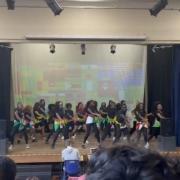
This is an interview of Mrs Eugenie Brogie who was a World War 2 Evacuee, sadly who passed away also. She gave this information about her earlier life and this is how she answered:
Maya – When were you born and how old were you when the war started?
Mrs Brogie – I was born in 1913 and was 25 years old when the war started on 3rd September 1939 at 11:00 a.m.
Maya – What do you remember about the time before the war starting?
Mrs Brogie – Neville Chamberlain, the prime minister, had managed to get an 18 moth reprieve on the start of the war by having Germany sign the treaty, this was to provide time for Britain to be ready for the impending battle. He had put pressure on the telecommunication company at Faraday House near St Paul’s Cathedral where we ran a small café to complete the project which was meant to have taken 3 years to complete to be done within this timescale and there was a lot of work going on in the night and weekends. It was good for us at the café as we had all the extra income from the workers at Faraday House.
Maya – Do you recall anything specific which you felt was prophetic about the days ahead?
Mrs Brogie – In April 1940, President Roosevelt had send appropriate words to Prime Minister Chamberlain from the poem by Poet Longfellow from O Ship of State, which highlighted the forthcoming war.
‘Thou, too, sail on, O Ship of State!
Sail on, O Union, strong and great!
Humanity with all its fears,
With all the hope of future years,
Is hanging breathless on thy fate!
Maya – Who do you think was the most influential person to help the allies win the war?
Mrs Brogie – Without a shadow of doubt Mr Winston Churchill was the reason why Britain won the war. On the 10th of May 1940 when Churchill was elected prime minister he said that all he could give the British public was Blood, Sweat, Toil and Tears but would never surrender. The war was won because of Churchill and his awe inspiring speeches. The Germans were better organised, for example they had the knowledge that the English bombers could only fire alongside and down but not upwards and therefore the German Luftwaffe would bomb the British planes from the top and avoid any risk of themselves being fired at. If it was not for Churchill, Germany would have won the war.
Maya – What are your memories of the war?
Mrs Brogie – The British had been losing bombers all along the coast where most of the fighter planes which kept which had been bombed by the Germans. The government decided to build new bombers further inland with soldiers flying the new aircraft. The aim was to hit Berlin before Germany hit London and in September 1940, the British bombers hit Berlin first.
Then on September 20th 1940, London was hit by German Bombers. 4 bombs were dropped on that day over Cannonsbury and the house we lived in was hit by one of the bombs. 9 of us were in the house at the time but luckily none of us got injured. When we stepped out of the room we had holed up in once the bombing stopped my cousin mentioned that she could see the stars in the night. We had realised that the roof of the house had been blown off and half the building had been bombed to the ground. Our neighbour had an underground room and we all ended up sleeping in there. On the following nights 5 bombs were dropped rather than 4 as per the previous day.
After the bombing of the house I was left with 2p, a bucket of wood and a bucket of coal. I went out in the bombed section and found an egg which was still un-cracked and a can of baked beans. This was all I had with no roof over my head.
Maya – What happened to your husband during the war?
Mrs Brogie – My husband was interned under section 18B as he was an Italian even though he had live in UK since he was 13 months old. All Italians who had visited Italy in the last 20 years prior to the start of the war were interned (arrested as prisoner of war)
Maya – Do you remember a specific date during the war when you were most scared?
Mrs Brogie – On the 10th and 11th May 1941, the Germans had sent bombers over London and they bombed across London from 5.00 p.m. till 8:00 p.m. the following morning. London was alight through the night because of the fire all around. You could see from one end of London to another.
Maya – Did you have to help with the war?
Mrs Brogie – We had to help out in the docks with the merchant ships from USA, to send arms and provision to Russia by the submarines or by ships. Once 39 ships from USA had arrived to be sent onto Russia and only 5 of these made it with the rest all being lost together with their crews and this was one of the biggest loses.
Maya – I was told that you mention the contribution made by each nation to the war effort in one sentence, can you tell me what this is?
Mrs Brogie – During the war, the British gave the time, the Americans gave the arms but the Russians gave the blood.
By Maya Savla - Newstead Wood School



























